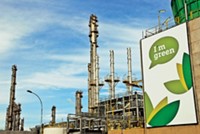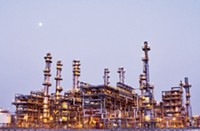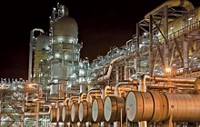Advertisement
Grab your lab coat. Let's get started
Welcome!
Welcome!
Create an account below to get 6 C&EN articles per month, receive newsletters and more - all free.
It seems this is your first time logging in online. Please enter the following information to continue.
As an ACS member you automatically get access to this site. All we need is few more details to create your reading experience.
Not you? Sign in with a different account.
Not you? Sign in with a different account.
ERROR 1
ERROR 1
ERROR 2
ERROR 2
ERROR 2
ERROR 2
ERROR 2
Password and Confirm password must match.
If you have an ACS member number, please enter it here so we can link this account to your membership. (optional)
ERROR 2
ACS values your privacy. By submitting your information, you are gaining access to C&EN and subscribing to our weekly newsletter. We use the information you provide to make your reading experience better, and we will never sell your data to third party members.
Business
Thinking Locally, Acting Locally
Nova Chemicals presses on as a regional player in a global business
by Alexander H. Tullo
July 10, 2006
| A version of this story appeared in
Volume 84, Issue 28
One might think running a company that is dependent on the styrene molecule and the economics of making ethylene from natural gas in North America would be a soul-sapping experience these days. But this is not the case for Jeffrey M. Lipton, 63, chief executive officer of Nova Chemicals. He is famously upbeat about the prospects for his company and the North American chemical industry.
But Lipton is also a realist. He acknowledges that his company has made mistakes and that it is a small player relative to global giants like ExxonMobil Chemical and Dow Chemical. As a result, Nova has focused on strengthening the advantages it has in Alberta, putting out value-added products in polyethylene and styrenics, and solving its problems in commodity styrene derivatives.
The past several years have seen no shortage of discussion about North America's grim future in petrochemicals. About 70% of the North American ethylene industry is based on natural-gas-derived feedstocks such as ethane. And since 2000, the region has seen some of the highest natural gas prices in the world.
The Middle East, on the other hand, has traditionally had the world's cheapest ethane because its gas has had no market other than conversion into ethylene and derivatives such as polyethylene and ethylene oxide. As a result, no major new ethylene capacity is scheduled for North America, but the Middle East is undertaking one of the largest building sprees the petrochemical industry has ever seen.
Speaking at the American Chemistry Council's recent annual meeting, Lipton, who currently serves as ACC chairman, challenged the idea of the U.S. chemical industry's demise. He said growing exports of liquefied natural gas (LNG) and synthetic liquid fuels from the Middle East are creating an alternative use for ethane. "As LNG and synthetic gas become global commodities, much of the supposed pressure on the U.S. chemical industry will ease off," he told the audience. He noted that recently announced ethane price increases in Saudi Arabia are scheduled to take effect in 2012.
In a subsequent discussion with C&EN, Lipton elaborated on his thinking. Because ethane has more energy per cubic foot than methane, he reasons that ethane can beef up the energy content of LNG shipments. "So ethane becomes more valuable than methane in the LNG business," he said. "And natural gas in global markets is worth a lot more than the Middle Eastern producers of oil, gas, and ethane are getting from petrochemicals."
He concludes that the U.S. chemical industry shouldn't be written off. "For government officials to say, 'Well, forget chemicals, they are all going to leave the U.S. anyway,' is just fallacious," he said. "The U.S. is going to be a good place to make petrochemicals for the long term, provided we have a reasonable amount of feedstock."
Nova has an enormous stake in the North American industry. Of its $5.6 billion in 2005 sales, 64% was derived from its olefins business, which operates plants only in Alberta and Ontario. The balance of its revenues comes mostly from styrenics in North America and in a joint venture in Europe.
In Alberta, Nova has access to lower cost natural gas than the rest of North America does. This is the so-called Alberta advantage of about 5 to 7 cents per lb of ethylene versus light-feed crackers on the U.S. Gulf Coast.
But Nova's most recent expansion in Alberta—a 2.8 billion-lb-per-year joint venture with Dow that started up in 2000—tapped all of the available gas in the province. Another large expansion, Lipton concedes, would have to wait until natural gas pipelines from the Mackenzie Delta in the Northwest Territories and Alaska are completed toward the beginning of the next decade. "If we wanted to start building today in Alberta, there wouldn't be enough feed for significant growth," he said. "When the Alaska pipeline comes, we can double capacity in Alberta."
The company has also been trying to expand in Mexico. Nova was named as a partner for the Phoenix Project, a $1.9 billion petrochemical undertaking led by Mexican state oil company Pemex. The project was politically controversial, given Pemex's long-standing monopoly on hydrocarbons in the country, and was eventually shelved when the government couldn't agree to terms for the natural gas condensate feedstock.
Pemex is now planning modest expansions to existing ethylene facilities, and Nova is still negotiating a downstream polyethylene joint venture. Lipton remains hopeful that Pemex will be able move forward with the simplified plan. "I don't know if we can make it happen, but we are trying," he said.
Beyond Mexico, Lipton acknowledges, Nova's chances of expansions in olefins are limited. "I don't see the prospects in the short term of us going much farther south than Mexico," he said. "A company our size would be taking an excessive risk if it were to go into a politically risky area—let's say Venezuela or the Middle East—alone and put up $1 billion or $2 billion."
Instead, Nova has been trying to grow its olefins business with specialty grades of polyethylene made through its Advanced Sclairtech technology. The company sold about 470 million lb of these premium resins last year.
Styrenics has been troublesome for Nova. The business hasn't turned a net profit since 2000, and only once since 2001 has it lost less than $100 million.
The company is trying to reverse this trend. It is forming a separate unit for its styrene and solid polystyrene business, called Styrenix, that will include a recently formed European styrenics joint venture with Ineos, styrene plants in Texas and Ontario, and three solid polystyrene plants. Including the previously announced shutdown of its Chesapeake, Va., plant, the company expects to cut 375 jobs and save $65 million with the move.
Not included in Styrenix are its expandable polystyrene business and some specialty styrene-based resins such as Arcel polystyrene-polyethylene foam and Dylark and Zylar styrenic copolymers.
Analysts have applauded the move as a way out of the styrene business. "We believe the creation of Styrenix is a step closer for [Nova] to either sell the business or form a joint venture," says Frank J. Mitsch, an analyst with BB&T Capital Markets.
When Lipton sat down with C&EN about a week before Styrenix was announced, he hinted at upcoming actions for the business. "What we have to focus on for the commodity piece of the business is cost reduction," he said.
Lipton further admitted that building up the business, including the 1999 purchase of Huntsman's styrenics arm for $800 million, was a mistake. He said Nova did not foresee how much coproduct styrene would be put on the market by new propylene oxide plants or how expensive benzene would get in the years that followed. "Missing those two issues led us to make the wrong decisions on styrenics," he said.
And although Styrenix isn't being billed as a spin-off, Lipton said he is open to divesting it. "If you let me give it all back and go back to 1993 without styrenics, I would say 'gladly,' " he said. "But we have it, and now we have to do something that makes sense. We would sell it, joint venture it, anything we could do to help our shareholders."
And a divestiture of the styrenics business could make Nova an even greater acquisition target than it normally has been. "The logic is that we are small relative to a lot of companies in the industry," Lipton said. "We've got good technology, a competitive advantage in Alberta, and a good distribution system. It is inevitable that when people think about growing and they are not in North America, they would think about Nova. It is just a fact of life that we are a potential acquisition candidate."
Lipton claims he isn't opposed to being taken over if it means maximizing value for his shareholders. "We see our job clearly as not making little plastic pellets. It's making little plastic pellets so we can make money," he said.








Join the conversation
Contact the reporter
Submit a Letter to the Editor for publication
Engage with us on Twitter